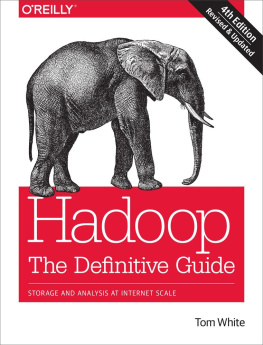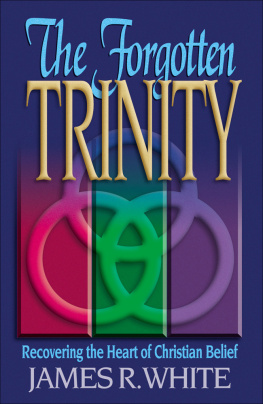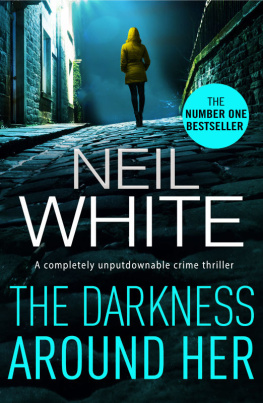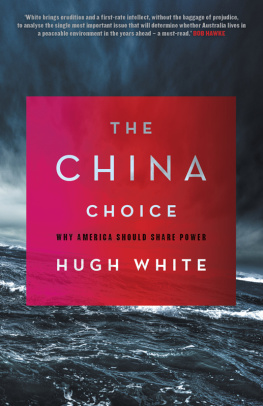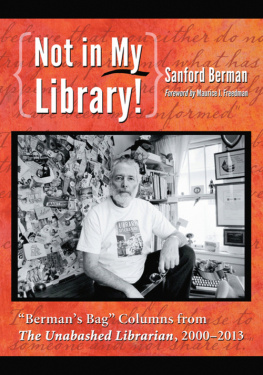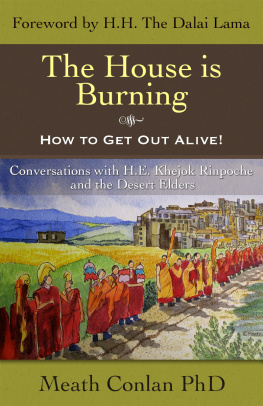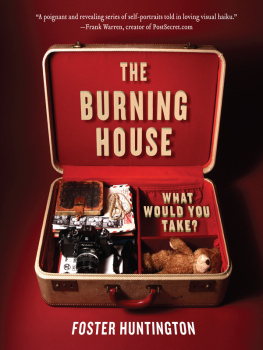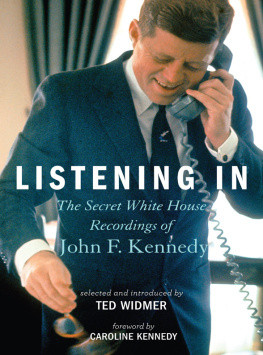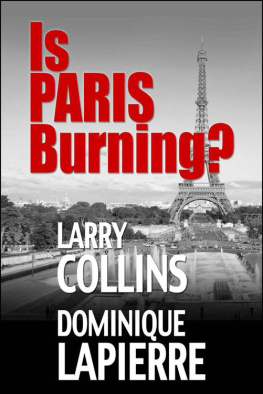White - The Burning Library
Here you can read online White - The Burning Library full text of the book (entire story) in english for free. Download pdf and epub, get meaning, cover and reviews about this ebook. year: 2010, publisher: Knopf Doubleday Publishing Group, genre: Detective and thriller. Description of the work, (preface) as well as reviews are available. Best literature library LitArk.com created for fans of good reading and offers a wide selection of genres:
Romance novel
Science fiction
Adventure
Detective
Science
History
Home and family
Prose
Art
Politics
Computer
Non-fiction
Religion
Business
Children
Humor
Choose a favorite category and find really read worthwhile books. Enjoy immersion in the world of imagination, feel the emotions of the characters or learn something new for yourself, make an fascinating discovery.

- Book:The Burning Library
- Author:
- Publisher:Knopf Doubleday Publishing Group
- Genre:
- Year:2010
- Rating:3 / 5
- Favourites:Add to favourites
- Your mark:
- 60
- 1
- 2
- 3
- 4
- 5
The Burning Library: summary, description and annotation
We offer to read an annotation, description, summary or preface (depends on what the author of the book "The Burning Library" wrote himself). If you haven't found the necessary information about the book — write in the comments, we will try to find it.
White: author's other books
Who wrote The Burning Library? Find out the surname, the name of the author of the book and a list of all author's works by series.
The Burning Library — read online for free the complete book (whole text) full work
Below is the text of the book, divided by pages. System saving the place of the last page read, allows you to conveniently read the book "The Burning Library" online for free, without having to search again every time where you left off. Put a bookmark, and you can go to the page where you finished reading at any time.
Font size:
Interval:
Bookmark:
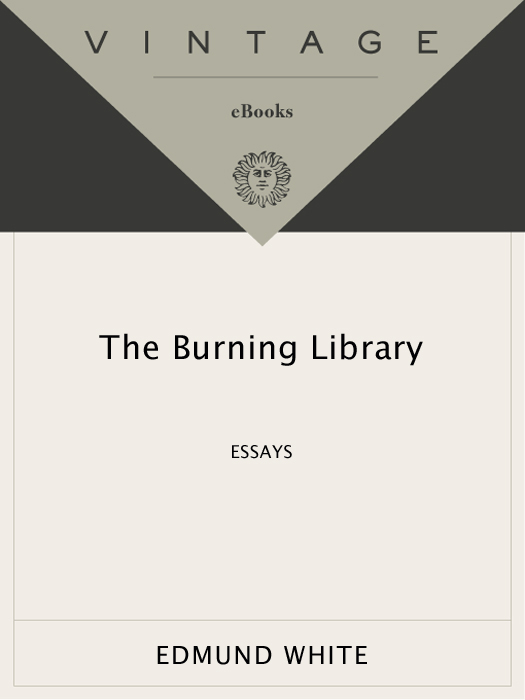
ACCLAIM FOR Edmund Whites
A scrupulous, often elegant stylist . In its genial, smart appreciativeness, [his literary criticism] remains remarkably consistent . Brilliant connoisseurship.
Boston Globe
A man who lives at the edge of the society he so painstakingly observes, his highest good the truth of the imagination.
The New York Times Book Review
Unified by sharp wit and seemingly boundless erudition . When White essays literature, he nears perfection.
Publishers Weekly
There can be few recent critical volumes, however considered or substantial, that measure up to this collection in charm, perspicacity, or wisdom.
The Sunday Times (London)
A Diderot or Voltaire without the formers scorn or the latters indignation, but armed with the same deep moral awareness and the same ability to charm the socks off the reader even while retailing unpalatable truths . [A work of] unparalleled stylistic elegance.
The Observer
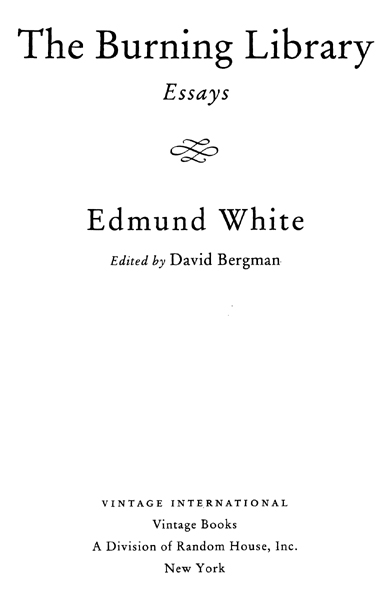
To the memory of my mother
David Bergman
No one has a slogan, no one even has an attitude, but somethings brewing, wrote Edmund White in a letter describing the riot that had broken out one warm Friday night in June 1969 in the West Village outside the Stonewall Inn, a gay bar that he sometimes patronized. His letter, to Ann and Alfred Corn, friends then living in Paris a city he would later claim as his home is filled with a youthful wonder and disbelief at being at the center of events. For White the police skirmish was the start of a revolution and the Stonewall Inn nothing less than that mighty bastille. There he was, caught in the current of what one queen tartly dubbed the swish heard round the world.
The Stonewall Riots, which many see as the start of the gay liberation movement, were not a one-night affair. Clashes with the police went on all weekend. On the second night, Saturday, White returned to Sheridan Square to give stump speeches about the need to radicalize, how we must recognize were part of a vast rebellion of all the oppressed. His calls to arms were met not only by jeers and cheers, but also by the embrace of straight Negro boys, who now viewed him as a brother in the Struggle. Yet the most decisive result of his oratory was that it symbolically divided him from the dreary middle-class East Side queens, who stood about disapproving yet unable to leave, torn between their class loyalties, their desires to be respectable, and their longing for freedom.
In the Hollywood version of his life, in which White no doubt would be played by Tom Cruise, this scene replete with burning buildings and howling squad cars, sadistic policemen in a paddy wagon as big as a school bus, scantily dressed hustlers toting parking meters and a mad Negro whirl[ing] like a dervish with a twisted piece of metal this scene of anarchy and devastation would become the site where the young gay writer is born. And indeed his novel The Beautiful Room Is Empty concludes with this attack on Fort Disco. But the truth is, as usual, more complicated and less cinematographic. By the time the Stonewall Riots occurred, White had virtually finished Forgetting Elena, his first published novel; he was already a veteran writer for Time-Life Books and was about to begin the first essay in this collection, The Gay Philosopher. Yet the impact of the Stonewall Riots should not be underestimated. It brought dramatically to the surface the crisis of language with which Edmund White had been struggling, and also began a social/sexual movement he has spent over two decades participating in and chronicling.
Edmund White was born in 1940 in Cincinnati, that Valhalla of Republicanism, as he dubbed it, and he lived there off and on until he graduated from college. The impact of the Midwest and Cincinnati cannot be underestimated. For all the cosmopolitan baggage he carries around, he still keeps a rucksack filled with the insular ethic of the Queen City. His novels are filled with small enclosed places the island kingdom of Forgetting Elena, the island colony in Caracole, the Manhattan island of The Beautiful Room Is Empty. All these imaginative spaces are informed by his knowledge of Cincinnati, where White first witnessed a grand Balzacian canvas of greed, corruption, competition and disappointment as painted by his father, who knew, according to States of Desire, everyones pedigree and pretensions, the scope of their infidelities and the true size of their bank accounts.
The lyricism of Whites prose hides the fact that his interests are sociological rather than psychological. He shows his disdain for psychology when he packs the pill-popping, brow-beating, insane Dr OReilly of A Boys Own Story and The Beautiful Room Is Empty off to the sanitarium for a dose of his own medicine. His particular strength is his ability to see how the material forces at work hold his characters in vital tension. Even in the make-believe world of Caracole where the ethos seemingly shapes the action, it is the pressure of the imperial forces that really holds this world together. Not that the characters are marionettes, whose strings are pulled by the vulgar but economically superior conquering army. Rather the conquerors have roped off the little island where the action takes place and turned it into a fighting ring. It is not surprising, therefore, that one of Whites assignments as an editor for Time-Life Books was to help write The First Man, a book of popular paleontology, in which he could examine layer upon layer of human development. Whites fiction and non-fiction share this same vision of social dynamics.
Whites apprenticeship with Time-Life Books reinforces an important point. If we now view Edmund White primarily as a novelist, this was not how he first made his name. For a long time he was better known as a journalist and editor he was an editor for both Horizon and the Saturday Review for brief periods. (Forgotten is his experience as a playwright; his Blueboy in Black, about a black maid who gains control over a white family, met with mixed reviews when it premired off-Broadway in 1963, as did Trios when it was staged in London in 1993.) Although Forgetting Elena and Nocturnes for the King of Naples, his first two published novels (1973, 1978), won him a literary reputation among a small group of New York intellectuals, it was the publication (in 1977) of The Joy of Gay Sex (with Charles Silverstein) and States of Desire: Travels in Gay America (1980), two works of non-fiction, that brought him a large general readership. Even after the success of his novels, White has continued to write non-fiction, including his monumental biography of Jean Genet. The essays collected in this volume represent almost a quarter century of non-fiction writing.
The novelist career and the journalist career have always been intertwined. As an essayist, White is at his best when he brings to his subject a kind of novelistic color and texture. His best pieces rely as much on atmosphere as on facts, on striking a general point of view as much as establishing specific positions. And as a novelist, he places plot and psychological depth second to evoking a society in which the narrative is performed. In fact, his novels seem closer to the imaginative ethnography of the nineteenth century than to modern American fiction; in his books he often plays a dandified Melville jumping ship and living among some mystifying but attractive tribe of strangely and barely clad natives.
Font size:
Interval:
Bookmark:
Similar books «The Burning Library»
Look at similar books to The Burning Library. We have selected literature similar in name and meaning in the hope of providing readers with more options to find new, interesting, not yet read works.
Discussion, reviews of the book The Burning Library and just readers' own opinions. Leave your comments, write what you think about the work, its meaning or the main characters. Specify what exactly you liked and what you didn't like, and why you think so.


